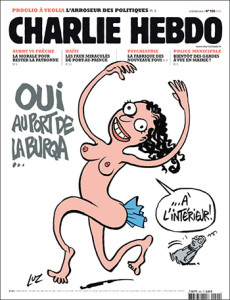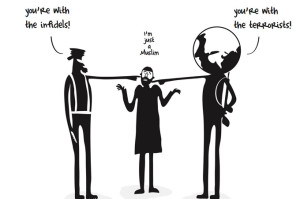By Marina Fuser
This was a disturbing weekend for humanity: from Paris to Nigeria, from Lebanon to São Paulo, we have experienced ultimate demonstrations of violence against people that, by all means, did NOT deserve such fate. While Brazilian military police chased, dropped tear gas bombs and shot rubber bullets against an unarmed crowd fighting against a raise in the bus fare, and Syrian refugees were freezing to death at inadequately improvised camping grounds in Lebanon, we heard the striking news from Paris: 12 cartoonists of the satiric magazine Charlie Hebdo were murdered by a group of terrorists. Before they even announced a connection with the group Al-Qaeda, the international media was quick to announce: the terrorists were Muslims.
Solidarity promptly came from all parts of the world. Paris stopped. Tourists visiting the beautiful Parisian galleries interrupted their itinerary to dedicate their condolences to the victims. Among world leaders, even the infamous figure of Benjamin Netanyahu flew over to Paris to mourn for these unfortunate losses in such a tragic day for the city of lights.
Meanwhile, another incident, even more tragic – at least in numbers – has occurred in Baga, Nigeria. Boko Haram has brutally killed over 2,000 people, mostly children, mothers and elders. A bomb wrapped around a 10-year-old girl’s body exploded in a local market. Last year, the same group had killed over 10,000 people. By all means, this is genocide. Yet these 2,000 bodies were rendered invisible by the Western mainstream media. They were discretely mentioned, but the spotlight was reserved for the 12 deaths in Paris. What happened in Paris is horrible, but its media coverage made it clear that there are bodies that are more worthy of mourning than Others. The disproportional media coverage that attributed little importance to Nigerian bodies made me wonder if and to what extent black lives matter to them. In a recent article about police violence against young black boys in the United States, Judith Butler offers points for further reflection:
“Perhaps we can think about the phrase ‘black lives matter’. What is implied by this statement, a statement that should be obviously true, but apparently is not? If black lives do not matter, then they are not really regarded as lives, since a life is supposed to matter. So what we see is that some lives matter more than others, that some lives matter so much that they need to be protected at all costs, and that other lives matter less, or not at all.”
Speaking “nearby” the lives that remain in the margins, we come across the colonial idea of alterity. Nigerian bodies were rendered invisible, while Paris is still mourning for its losses. This is perhaps based on the all-too-familiar binary of hierarchy between the West and the Rest. Yet, this cultural and multi-ethnic umbrella known as the West also produces its own Others. Muslims have lived in France over generations, and most of them come from former French colonies. They were not granted the privilege of living in France as an act of benevolence. In fact, France had invaded their land first. They were colonized and subjected to the worst of atrocities. As Professor Rosi Braidotti said in a lecture at Utrecht last summer: “Fascism was Colonialism coming home: it was all experimented by colonial setting.”
Indeed, French colonial enterprise has earned a reputation of being amongst the cruelest – although such a comparison seems inadequate. The point is that from Algeria to Senegal, from the still French Ivory Coast to the also still French Martinique, French Others had a connection with France even before they crossed the French border. Most Muslims currently living there are French citizens and are, therefore, entitled to the same rights and responsibilities as white “traditional French” (whatever that means). Marine Le Pen recently claimed that French culture was under attack. Can we even talk about one cohesive French way of living?
Whether Le Pen thinks of them as French or not, Islam is France’s second most professed religion (5-10% of the population). According to the government, there is an estimate of 5-6 million Muslims living in France. The recent attack shocked precisely because this doesn’t happen in France. To blame it on Islam is a dangerous generalization. Islamophobia is no big news to France, but in the context of European crisis and the rhetoric of the post-9/11 “War on Terror”, the barrier of exclusion has been raised, socially as well as institutionally. Muslims have been banned from praying in public since 2011. What happened to freedom of speech, this value so dear to modern France? If so many global leaders gather today in the name of “tolerance”, what can we say about religious tolerance? The recent ban of the niqab (a veil that covers most of the face) in public places also signaled institutional hostility towards Muslim people. Ripped from some of their religious practices and traditions, they are constantly reminded that they are not welcome in France, regardless of being born and raised there.
The marginalization of Muslims in France was emphatically noted by Hebdo’s former cartoonist, Olivier Cyran, according to whom the “belittling Muslims is no longer the sole privilege of the extreme right, but a right to offend which is sanctified by secularism, the Republic, by ‘co-existence’”. He adds: “and even… by the rights of women. It’s widely believed today that the exclusion of a veiled girl is a sign, not of stupid discrimination, but of solid, respectable feminism, which consists of pestering those whom one claims to be liberating.”
In this (neo)colonialist approach to feminism, the idea of a free woman is measured by all-too-Western standards. To forbid Muslim women to wear the veil is considered an act of emancipation, yet one which completely disregards their own will and desire. In one of Charlie Hebdo’s comics, a Muslim woman is depicted not just with her head and face uncovered, but completely naked, with a burqa coming out of her anus. She is objectified, but it is only a satire, so it makes it OK. Does it?
 Nevertheless, this lack of scruples has not always been the tone of the magazine. Cyran wrote an article in 2013, in which he claimed that the magazine had lost its initial anarchist inspiration. The political and social context has changed over the years. Little by little, and especially after 9/11, the magazine’s primary focus shifted from anti-clerical satire to singling out and ridiculing Muslims and their traditions. In his words: “Doubtless I would not have had the patience or the stoutness of heart to follow, week after week, the distressing transformation which took over your team after the events of September 11, 2001. I was no longer part of Charlie Hebdo when the suicide planes made their impact on your editorial line, but the Islamophobic neurosis which bit by bit took over your pages from that day on affected me personally, as it ruined the memory of the good moments I spent on the magazine during the 1990s.”
Nevertheless, this lack of scruples has not always been the tone of the magazine. Cyran wrote an article in 2013, in which he claimed that the magazine had lost its initial anarchist inspiration. The political and social context has changed over the years. Little by little, and especially after 9/11, the magazine’s primary focus shifted from anti-clerical satire to singling out and ridiculing Muslims and their traditions. In his words: “Doubtless I would not have had the patience or the stoutness of heart to follow, week after week, the distressing transformation which took over your team after the events of September 11, 2001. I was no longer part of Charlie Hebdo when the suicide planes made their impact on your editorial line, but the Islamophobic neurosis which bit by bit took over your pages from that day on affected me personally, as it ruined the memory of the good moments I spent on the magazine during the 1990s.”
He attributes his disconnection from the magazine to “corrupt promotion practices of the employer” and the lack of freedom among the editors. “Then the Twin Towers fell and Caroline Fourest arrived in your editorial team. This double catastrophe set off a process of ideological reformatting which would drive off your former readers and attract new ones – a cleaner readership, more interested in a light-hearted version of the ‘war on terror’ than the soft anarchy of [cartoonist] Gébé. Little by little, the wholesale denunciation of ‘beards’, veiled women and their imaginary accomplices became a central axis of your journalistic and satirical production.”
Le Pen has openly declared war against those who pose a threat to French culture. She claims that “She is not Charlie”, as opposed to the massive-scale movement of solidarity to the magazine, evident in the “Je Suis Charlie” (I am Charlie) hashtag. Although they don’t share the same beliefs or practices, what Marine Le Pen and Charlie Hebdo have in common is precisely Islamophobia. The theologian Leonardo Boff Boff stresses: “Just like all marginalized people, French Muslims are target of attacks of groups of the extreme-right. These attacks kill people”. In fact, in retaliation, three blank grenades have been thrown at a mosque in Le Mans, not too far from Paris. Several attacks against Muslims in Paris, Montrouge, and Lyon have been reported. There is a fear of a backlash of further hostility and violence toward Muslims. There has been some social pressure for the French state to take more severe political measures against ‘fundamentalists’ (which can easily be interpreted down the semantic corridor as a synonym for Muslims).
 [image by Khalid Albaih]
[image by Khalid Albaih]
The wakening of an open discrimination against Muslims will not bring back the cartoonists and does not repair the damage of this attack. Perhaps its aftermath can be a subject of further reflection about the very idea of tolerance and coexistence. There is no magic formula that resolves the problem of hostility between Insiders and Outsiders that share the same space, but it is possible to encourage the act of thinking through this strange encounter among neighbors that might not accept or understand the Other as familiar. The line that separates Same and Other can dissipate by encouraging practices of solidarity and empathy across internal and external borders. I believe we can “think of thinking” beyond colonial binaries, and hopefully smile and wish our neighbor a good morning.

One Comment Add yours